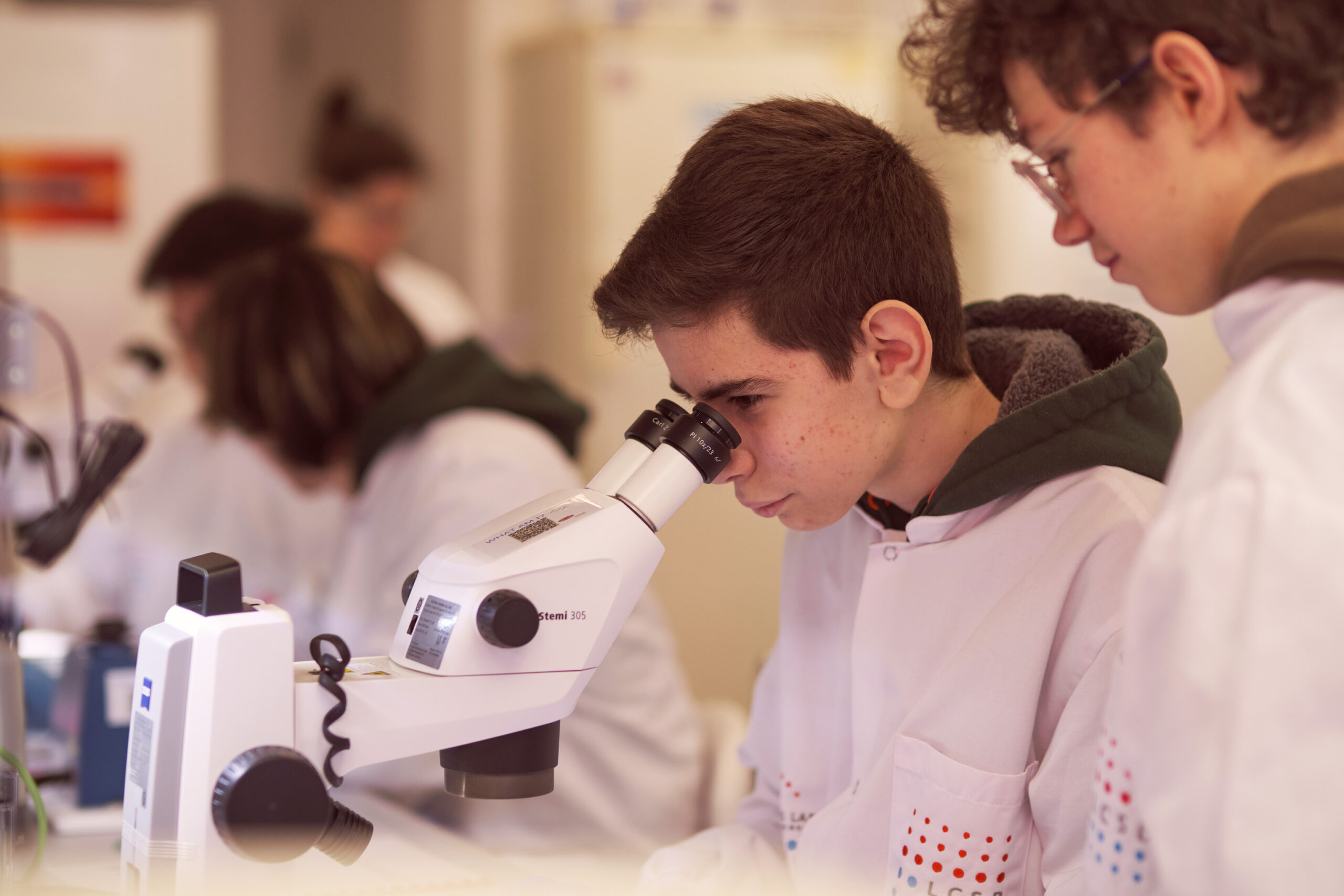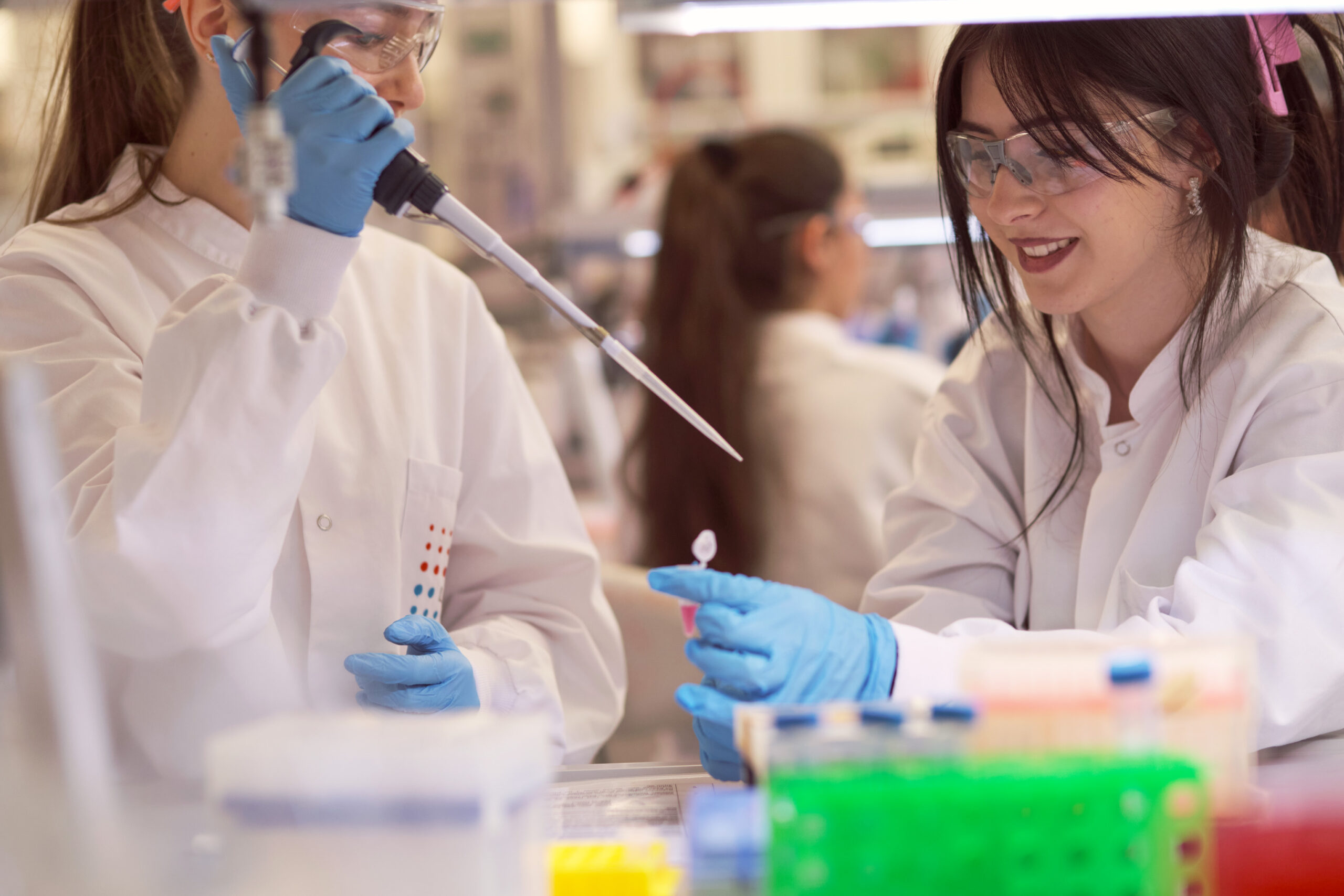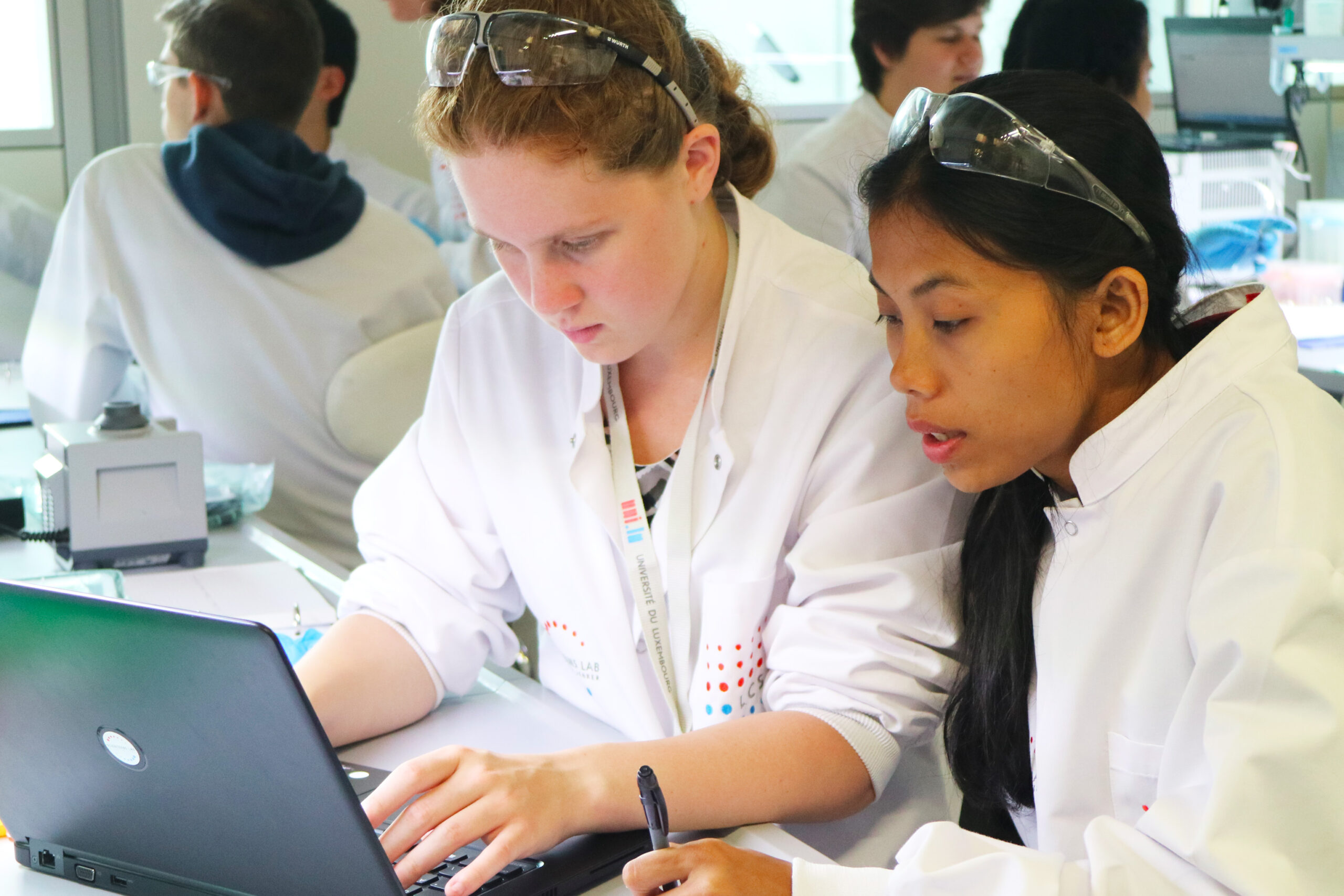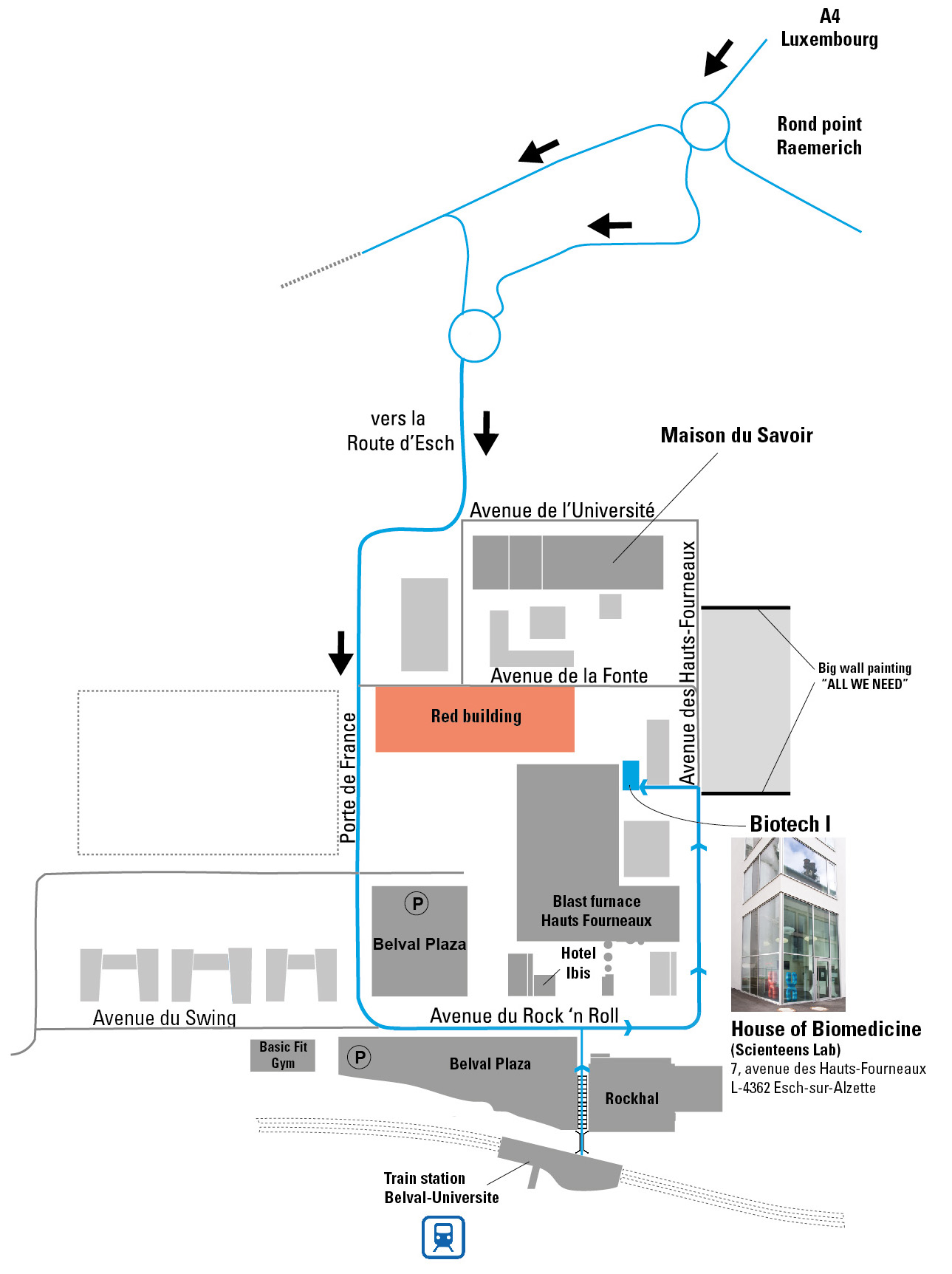Biology
The Scienteens Lab offers eight different biology workshops for secondary school classes. They focus on topics such as genetics, enzymology, immunology and research on specific diseases. Mosts of these workshops are designated for students aged 16 to 19. They take place on Campus Belval, in our dedicated biology lab, under the supervision of the Scienteens Lab’s team. Each workshop is described in the table below. You can also get a glimpse of our biology workshops through a short video.
This biology workshop focuses on exploring the effect of UV light on the DNA of the bacterium Escherichia coli.
The workshop starts with a short theoretical part to set the scientific context. Afterwards the students enter the lab to perform the hands-on experiments. Their results are critically discussed within the group at the end of the lab day.
Equipped with lab coats and gloves the high-school students have the opportunity to discover several research techniques:
- DNA-isolation
- Polymerase chain reaction (PCR)
- Agarose gel electrophoresis
During this workshop, the students will explore the world of proteins and in particular enzymes.
They will discover protein-specific lab equipment and techniques. Thanks to the theoretical explanations accompanying the practical work, they will be introduced to the scientific background and get to understand how this topic is closely linked to ongoing research. The participants will also learn more about the specific methods they applied during the day.
Equipped with lab coats, gloves and security glasses the high-school students have the opportunity to discover several research techniques:
- Protein extraction from Escherichia coli cells
- Protein purification with specific columns
- SDS-polyacrylamide gel electrophoresis
- Substrate specificity assay
During this one-day workshop, high school students have the unique opportunity to learn more about the biomedical background of cancer and the work of the scientists focusing on this group of diseases.
The workshop starts with a short theoretical part to engage the students in a dialogue about the topic and to set the scientific context. Afterwards, the students enter the lab to perform hands-on experiments. At the end of the day, the students’ findings will be critically discussed and placed in a scientific framework.
Equipped with lab coats, gloves and safety glasses the students have the opportunity to discover several research techniques:
- Manipulation and observation of human cancer cells under a laminar flow hood.
- Counting and viability test of the collected cells
- RNA extraction and quantification
If you want to take part in this workshop, you need to book it at least two weeks in advance since it takes some time to develop the cancer cell cultures.
The first step in cancer research is to understand the molecular and genetic background of a specific cancer. This is what the students explore in our workshop “Discovering Cancer Research – Part 1”. “Discovering Cancer Research – Part 2” allows them to dig deeper and get a better understanding of the translational research needed to cure this disease.
How can we treat a specific cancer? What kind of medication could be effective? Why are some patients developing resistance against specific drugs? And how can we deal with it? These are some of the questions the students tackle during this workshop. This is done by practical work units in the lab that are accompanied by theoretical explanations about skin cancer, relevant metabolic pathways and treatment approaches. The students gain in-depth knowledge on the topic and get to understand the importance of current research.
Equipped with lab coats, gloves and safety glasses the students have the opportunity to discover several research techniques:
- Quantification of RNA extracted from human skin cancer cells
- Complementary (c) DNA conversion of the RNA
- Quantitative real-time polymerase chain reaction (qRT-PCR)
This workshop can be booked as a one-day event but also in combination with the workshop “Discovering Cancer Research – Part 1” as a two-day event. Participation in workshop part 1 is not necessary to attend workshop part 2. For more information please contact Dr Maren Krüger.
How can we have a better agricultural productivity? How to increase crops’ yield? During this new workshop, students discover techniques that can be used to explore these questions, such as plant immunisation and development of genetically modified organisms (GMOs).
The participants work on the example of the tomato (Solanum lycopersicum) and the Pepino Mosaic Virus which affects tomato crops. After an introduction on the cultivation of tomatoes and immunology, the students head to the lab to assess whether tomatoes have been immunised or not through hands-on experiments. Afterwards, a short presentation tackles the topics of GMOs and restrictions enzymes, proteins that cleave DNA into fragments at specific sites and are useful tools in genetic engineering. The budding scientists then determine, through laboratory techniques, the identity of different restrictions enzymes.
Equipped with lab coats, gloves and security glasses the high-school students have the opportunity to discover several research techniques:
- Enzyme-linked immunosorbent assay (ELISA)
- Agarose gel electrophoresis
- Restriction enzyme assay
Systems biology is a biology-based interdisciplinary field of study that focuses on complex interactions within biological systems. It combines biology, computer science and systems sciences. The biological data that are produced in the lab are analysed by computational approaches, taking the complete biological system into account and not only individual parameters. Interactions between components in biological systems are analysed and how these interactions give rise to the function and behaviour of that system, for example, enzyme and metabolites in a metabolic pathway.
In this workshop the activity of an enzyme called ß-Galactosidase (ß-Gal) will be analysed. The enzyme in question is involved in the splitting of lactose into glucose and galactose. After a theoretical introduction, the students will make their first experience with the software CellDesignerTM and will work out their own computational model of the lactose-pathway. They will learn which biological data is needed to feed the model. This data will be generated by themselves in the laboratory. At the end of the day, they will know whether it is possible to computationally model the activity of ß-Gal and they will better understand how interdisciplinary biology works nowadays.
Equipped with laptops and lab coats the high-school students have the opportunity to discover several research topics:
- The lactose pathway in the cell
- Lab activities to determine the Michaelis-Menten constant and the velocity rate of the enzyme-catalysed reaction
- Computational modelling of the activity of the enzyme ß-Galactosidase with the software CellDesignerTM
Parkinson’s disease (PD) is the second most common neurodegenerative disease and it currently affects over 1.2 million people across Europe with close to 1200 confirmed Parkinson’s cases in Luxembourg. This workshop introduces high-school students to PD and shows how animal research can provide new insight into a disease. Animal welfare and regulation as well as new and innovative replacement methods are also be explored.
Equipped with lab coats and laptops the high-school students have the opportunity to discover through hands-on activities several research topics:
- Neurons and Parkinson’s Disease
- Behavioural studies in the fruit fly Drosophila melanogaster and research alternatives
- The 3R’s of animal research (Replacement, Reduction and Refinement) and how to monitor the welfare of research animals
This workshop targeting classes from 5e and 4e aims to provide the students with an overall insight into the life of a researcher and lets them explore several aspects of biological research. The class can choose 3 out of 4 one-hour activities, each focusing on a different element of biological research:
- DNA extraction: Extraction of genetic material is the starting point for many methods and experiments. The students extract their own DNA and learn how this genetic material could be used.
- Cell culture: The students work in a cell culture room, manipulate cells and learn about the importance of sterile conditions when working with these cells.
- Robotic and Automation: From robots that automatically maintain cells to high throughput screening platforms, automation in research has been growing immensely over the last year. In this activity, students program a robot that takes over the tedious task of pipetting.
- Model organisms and behavioural assay: Animal research plays an essential role in our understanding of health and disease and in the development of treatments for both animals and humans. The students discover the world of model organisms with a special focus on the fruit fly, Drosophila melanogaster. They perform behavioural assays using the fruit fly.
These activities are accompanied by information about the life and work of a researcher and other professions that involve laboratory work.



Practical information for all the biology workshops
All the biology workshops are suitable for classes ranging from 3rd to 1st grade (in the Luxembourgish school system), meaning students aged 16 to 19.
The only exception is the workshop “A taste of research” that is meant for classes from the 5th and 4th grade (14 to 15 years old).
Depending on the needs of the high-school students the workshops in biology are either taught in German, French or English.
The workshops take place from 9:00h till 15:30h with a lunch break of one hour. During the lunch break the students can get some food from the restaurants that are located on Campus Belval and in Belval Plaza, or they can use the canteen. The lunch schedule need to be observed, so that the afternoon activities can resume on time.
The only exception is the workshop “A taste of research” that lasts 4 hours and takes place from 9:00 to 13:00.
Biology workshops take place in the house of biomedicine (Biotech I), on Campus Belval.
If you arrive by car or coach, take the A4 and keep it until the end, then follow the signs towards “Belval”. On the campus, there are no signs to indicate the way to Biotech I. Please use the map below to find your way. Parking around the building is forbidden. The coach can leave you in front of the Biotech I but cannot stay parked there.
If you arrive by train, the stop is “Belval Université”. Our building is 5 minutes away from the train station by foot. There are also several buses that can be taken to arrive on the campus.

There is a participation fee of 7 euros per student.
The Scienteens Lab sends an invoice after the workshop (no payment on site).
Teaching material for the preparation of the class will be provided to the teachers, but preparation of the students is not mandatory.
At the end of a workshop, each student receives a certificate attesting to his participation.
Biology workshops take place in a biosafety level 1 laboratory (BSL-1). This level is suitable for experiments involving well-characterised agents and organisms which do not cause disease in healthy humans. However, a number of security rules have to be observed:
- Wear closed shoes and long trousers.
- Long hair has to be tied in a ponytail or bun.
- Protective clothes (lab coat, gloves and safety glasses) have to be worn at all times in the laboratories and the corridors.
- It is forbidden to eat and drink in the laboratory.
- Smoking is not allowed at any time inside the building.
- It is not allowed to enter the laboratory during pregnancy.
- High-school students who seem under the influence of alcohol or drugs are not allowed to enter the lab.
If these rules are not observed by a student, he/she will be excluded from the workshop.
If there are known indispositions (e.g. allergic reactions) or disabilities, please inform us so we can take action in advance.